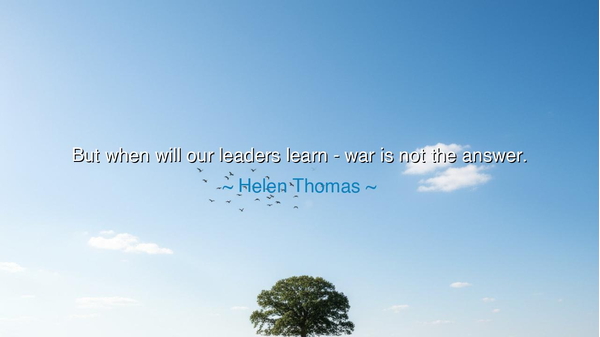
But when will our leaders learn - war is not the answer.






Helen Thomas, the fierce voice of a journalist who spent her life questioning the mighty, cried out with words that echo like prophecy: “But when will our leaders learn — war is not the answer.” In this cry lies both sorrow and defiance, the lament of one who has seen generation after generation repeat the same folly. She does not ask with idle curiosity, but with anguish: how many more must die before those entrusted with power understand the futility of violence? Her voice is the voice of the people, weary of bloodshed, yearning for peace.
The origin of these words lies in the long shadow of modern conflict. Helen Thomas, as White House correspondent, witnessed presidents send men to Vietnam, Iraq, and beyond. She watched promises of quick victories dissolve into years of suffering. She recorded the endless cycle of speeches that clothed war in noble words, only for mothers to mourn their children and cities to crumble in dust. Her cry, “war is not the answer,” rose from this bitter knowledge: that the so-called solutions of war are illusions, that each bomb dropped plants the seeds of future conflict.
To say war is not the answer is to declare that true solutions are found not in destruction, but in dialogue, not in conquest, but in compassion. History itself proves this. The First World War, waged with the promise of ending all wars, birthed the conditions for the Second. The invasion of Iraq, proclaimed as liberation, ignited chaos that burned for decades. Again and again, nations have reached for the sword, and again and again, they have discovered that victory on the battlefield does not heal the wounds of the soul.
Consider Vietnam. America poured its treasure and its sons into that land, believing that fire and steel could defeat ideology. Yet after years of endless sacrifice, the war ended not with victory, but with retreat. The jungles swallowed armies, and the people were left scarred for generations. Those who survived carried wounds of body and spirit, and the nation itself was torn apart in division. Here, Thomas’s words find living proof: war was not the answer; it was the wrong question.
But her cry is not only for nations; it is also for the human heart. In our homes, in our friendships, in our daily lives, how often do we choose conflict instead of patience, anger instead of understanding? We think victory will bring peace, yet discover only bitterness. The wisdom is the same: wherever strife arises, the sword cannot heal what only reconciliation can mend. To choose war, whether great or small, is always to choose loss.
The lesson for us is clear. Do not wait for kings or presidents to heed Thomas’s cry; begin in your own life. When anger tempts you to strike, remember that war is not the answer. When pride whispers that you must win at any cost, recall that victory through violence is hollow. Seek dialogue where others seek domination. Defend justice without becoming a destroyer of peace. Teach your children that true strength lies not in crushing an enemy, but in creating a friend.
Therefore, beloved, carry this truth forward: the world does not lack weapons, it lacks wisdom. It does not lack armies, it lacks compassion. If the mighty forget, let the humble remember. If the powerful wage wars, let the people wage peace. And perhaps one day, through countless voices echoing Helen Thomas’s plea, our leaders will finally learn — that war is not the answer, and never shall be.






MPNgen Hang Minh Puong
This quote is a stark reminder of the human cost of war. It raises the question of whether our leaders are truly learning from history. Are they so focused on power, control, or ideology that they overlook the toll war takes on innocent lives? What will it take for them to understand that war only creates more suffering and that peace, though challenging, is the only real solution in the long run?
DADieu Anh
Helen Thomas’s words are sobering. How many more conflicts must we endure before our leaders understand that war is not the answer? It makes me think—what are the underlying reasons that drive nations to war? Is it fear, power, or something deeper? How do we shift the mindset that perpetuates these endless cycles of violence and move towards finding peaceful solutions instead?
NANguyen Nguyet Anh
I find myself wondering if leaders actually believe that war is the solution or if it’s a convenient excuse for political and economic interests. Helen Thomas’s quote implies a sense of frustration with the ongoing cycles of violence. Is it possible for societies to hold their leaders accountable and demand peace, or are we forever stuck in the belief that war is necessary to resolve disputes?
LNTruong Le Nguyen
This quote feels like a call for change. We’re often told that war is inevitable, but Thomas’s words challenge that mindset. Are leaders truly incapable of seeing the devastating effects of war, or is it that the pursuit of power clouds their judgment? What alternatives do we have to promote peace? Can negotiation and diplomacy ever be as effective as military force in solving global conflicts?
LDThi Thanh Lieu Diep
Helen Thomas’s quote is a powerful reminder of how often war is used as a solution despite its consequences. It makes me wonder—when will we see a shift toward diplomacy and peaceful solutions in global politics? What will it take for leaders to recognize that war only breeds more violence and instability? Could it be that war is still seen as a tool of power and control rather than a last resort?